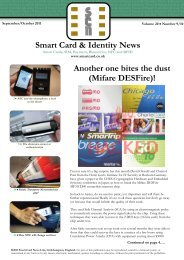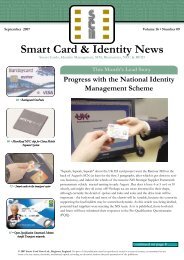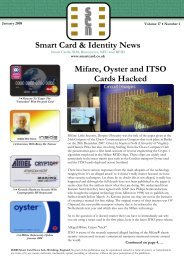Smart Card & Identity News A New Flavour for eCash
Smart Card & Identity News A New Flavour for eCash
Smart Card & Identity News A New Flavour for eCash
You also want an ePaper? Increase the reach of your titles
YUMPU automatically turns print PDFs into web optimized ePapers that Google loves.
Indian GSM Phone Networks Fail to Meet<br />
Basic Encryption Standards<br />
Eli Hizkiyev<br />
The recent revelations from an Indian company that it can ‘tumble’ and clone the<br />
credentials of mobile phone SIM cards over the airwaves will make anyone in security<br />
give a sigh. But when they hear that it is apparently because certain Indian GSM<br />
carriers are using the A5/0 minimal encryption system on their cellular networks, then<br />
the only response is frustration. Once again, we have to face the fact that GSM voice<br />
calls can no longer be considered secure.<br />
What adds insult to injury is that it appears that the Indian cellular networks are switching off most of their<br />
encryption to ease the load on their networks.<br />
The problem is that, even if A5/1 encryption is switched on, it can be cracked and facilitate eavesdropping - as<br />
researcher Karsten Nohl and his team started demonstrating some 18 months ago. If the cellular networks only<br />
use the more basic A5/0 encryption, it also becomes possible to clone SIM card identities and make calls<br />
charged to the legitimate user's account.<br />
What makes the Indian network issue relevant and concerning, is that many of the UK GSM carriers are also<br />
hitting digital gridlock on their networks in city areas at peak time, raising the question as to whether they too are<br />
lowering the encryption technology used on their calls to cope with the demand?<br />
It is interesting to note that none of the Indian cellular carriers were prepared to comment on the report, despite<br />
the news appearing in The Hindu newspaper, which has a circulation of 1.5 million amongst the English<br />
language speakers of India, as well as a global audience via its web site of many millions more.<br />
The problem <strong>for</strong> the carriers - as one of the researchers commented on in the report - is that the cracked calls<br />
appear to be coming from the subscriber's number, so it's difficult to see how they can stop these calls, apart<br />
from looking <strong>for</strong> excessive usage and/or calls to international/premium rate destinations that may be flagged as<br />
suspicious or unusual.<br />
The takeout from this story - and from previous reports of the A5/1 encryption system on GSM calls being<br />
cracked - is to switch to using 3G cellular services when making business and/or sensitive calls. However, since<br />
the A5/3 encryption mechanism used on 3G calls is a derivative of the MISTY Feistel crypto methodology - and<br />
some carriers are reportedly lowering the level of encryption - there is a danger that the diluted 3G encryption<br />
system can be cracked in a few hours, as was reported at the start of 2010 (http://bit.ly/xAOpeA).<br />
The real bottom line is that cellular calls - in common with all wireless transmissions - are inherently less secure<br />
than wired telephony, <strong>for</strong> the simple reason that the mobile device can only automatically authenticate itself over<br />
the airwaves.<br />
Put simply, this means that all of the data transmitted can also be eavesdropped by hackers who - if they are able<br />
to crack the underlying encryption system, all variants of which have clearly been found to be wanting - can<br />
monitor the data stream and eavesdrop on the voice plus data transmissions.<br />
This Indian newspaper report raises a number of security questions on several fronts, and this is be<strong>for</strong>e we even<br />
start to discuss the number of people using their smartphone <strong>for</strong> Internet banking...<br />
<strong>Smart</strong> <strong>Card</strong> & <strong>Identity</strong> <strong><strong>New</strong>s</strong> • March 2012<br />
16
















